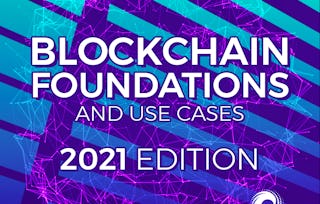Blockchain promises to disrupt industries once it will be efficient at large scale. In this course, you will learn how to make blockchain scale. You will learn about the foundational problem of distributed computing, consensus, that is key to create blocks securely. By illustrating limitations of mainstream blockchains, this course will indicate how to improve the technology in terms of security and efficiency.

Blockchain Scalability and its Foundations in Distributed Systems

Blockchain Scalability and its Foundations in Distributed Systems

Instructor: Vincent Gramoli
Access provided by Abu Dhabi National Oil Company
13,589 already enrolled
120 reviews
Recommended experience
Skills you'll gain
Details to know

Add to your LinkedIn profile
6 assignments
See how employees at top companies are mastering in-demand skills

There are 5 modules in this course
This week, we will start our exploration of the blockchain and its relation to distributed computing. In particular, we will learn the basics on blockchain abstraction and the importance of consensus between machines in order to mitigate the risks of having an attacker spend the same asset twice - an undesirable situation called 'double-spending'.
What's included
7 videos4 readings1 assignment1 discussion prompt
This week we will learn how classic blockchains try to solve consensus. We will look at the failures and delays blockchain systems must consider, and how these events may prevent machines from reaching consensus.
What's included
10 videos2 readings1 assignment1 discussion prompt
This week, we will investigate how to solve the consensus problem. To do this, we will first investigate how to solve consensus when failures cannot occur in the network. Later on, we will learn how to solve consensus when processes may fail, first through crash failures and then when processes can behave arbitrarily.
What's included
7 videos1 reading1 assignment1 discussion prompt
This week, we will investigate how delays in the network can impact the security of the blockchain. We will illustrate this using network attacks that allow hackers to steal digital assets in the past and that every blockchain designer should be aware of.
What's included
6 videos4 readings1 assignment1 discussion prompt
This week, we will explore how to design a scalable and secure blockchain algorithm. What makes a blockchain algorithm scalable and secure? To be secure, we need a consensus algorithm that works over the Internet and is not affected by unexpected communication delays. To be scalable, we need to get rid of the bottlenecks.
What's included
9 videos5 readings2 assignments2 discussion prompts
Instructor

Offered by
Why people choose Coursera for their career

Felipe M.

Jennifer J.

Larry W.

Chaitanya A.
Learner reviews
- 5 stars
71.07%
- 4 stars
19%
- 3 stars
4.95%
- 2 stars
1.65%
- 1 star
3.30%
Showing 3 of 120
Reviewed on Jun 18, 2023
Some practical aspects through simulation/ emiulation could have been included to provide more benefits to learners.
Reviewed on Dec 14, 2021
This course very help full for me because currently doing research project in collage and work on blockchain scalability problem and its solutions
Reviewed on Jul 18, 2022
The foundational elements of this course were indeed useful, however the wk3 dive into symbols and algorithms through me for a bit of a loop. Got there in the end.
Explore more from Computer Science

University of California, Irvine

University of California, Irvine

University of Illinois Urbana-Champaign

ConsenSys Academy

